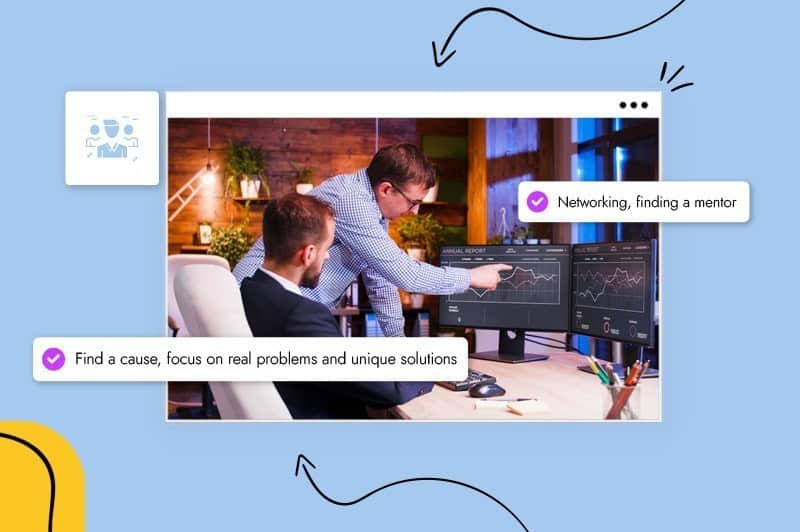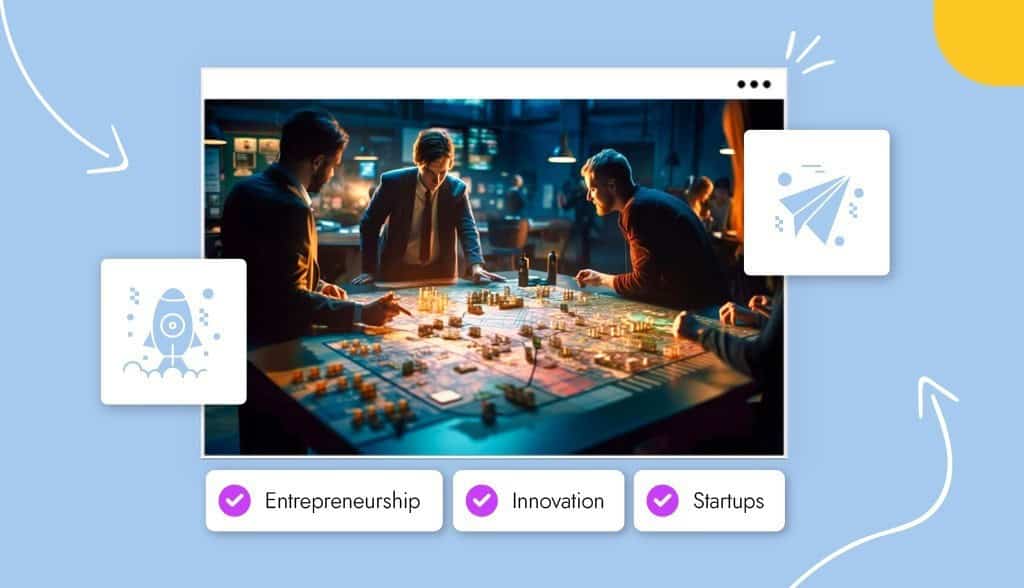In 1995, graphic design teacher Lynda Wynman created her website, Lynda.com, with 2 purposes:
To create a sandbox where she could play with the latest digital graphic design tools and enable her students to display their work.
Lynda soon saw the potential and moved all of her teaching online.
LinkedIn bought Lynda’s website/business, renaming it LinkedIn Learning for $1.5 billion.
Lynda is a true example of entrepreneurship.
What’s the lesson here?
Entrepreneurs don’t focus on products; they focus on problems and create solutions using specific skills.
But to use these skills takes an entrepreneurial mindset (it’s learnable), and to maximize its potential, you need to understand what entrepreneurship is and how to take advantage of what’s on offer.
And that’s what I’m going to tell you.
What is Entrepreneurship?

Entrepreneurship is when an individual (the aspiring entrepreneur) recognizes a problem or reacts to an economic change, bucks the conventional way of doing business, and creates a solution that transforms demand into supply under conditions of uncertainty.
In other words, they experience a problem, identify a solution, the market it’ll serve, create a product or service and sell it.
How?
It’s all about mindset and perspective.
The counter-conventional mindset of entrepreneurs
Entrepreneurship differs from what they teach in business school regarding risk, strategy marketing, etc.
In business school, you learn to fit within a pre-designed system and become a cog in the industrial wheel.
Entrepreneurs, however, use skills like creativity, critical thinking, problem-solving, and communication to form a mindset that fine-tunes their habits, attitudes, and thoughts to predetermine how they’ll respond when an opportunity arises.
And that’s what makes them different from your average Joe!
To become an entrepreneur, you must cultivate the 6 counter-conventional mindsets of entrepreneurs (Source – Ted Talks):
- Yes, I can: Entrepreneurs say yes to a problem and create a solution, whereas big businesses focus on what is already proven. For entrepreneurs, it’s always a good time to start a business.
- The problem comes first, not the product: Big businesses focus on products (then spend millions convincing us we need them), while entrepreneurs create solutions we already need.
- Niche down: Big companies focus on big target markets, while entrepreneurs identify a problem in a small target market and then provide a solution, which builds trust and often results in a global audience.
- Ask for the cash: Entrepreneurs raise money by selling the solution to their target audience and investors. Tesla is an example; when beginning it asked its narrow target audience (environmentally aware, wealthy, and image-conscious individuals) for deposits before creating its cars, which raised millions, enabling them to begin production.
- Beg, borrow, but don’t steal: Entrepreneurs use (beg and borrow) already established infrastructure and assets to support their solutions, like creating a tree top jungle business in a national park that already has the trees, parking, and facilities.
- Don’t ask permission: Industries and local government regulations don’t invite disruptive thinking (change) because it screws with their profits. Entrepreneurs don’t ask permission; they get on with it.
The takeaway:
An entrepreneurial mindset is a set of skills that enable people to identify and maximize opportunities, overcome and learn from setbacks, and succeed in various conditions.
Main Types of Entrepreneurship

When considering entrepreneurship, you’ve already taken the first step by wanting to become one.
Your next step is choosing the entrepreneurial path that suits your motivation, personality, and the business you want to start.
Here are your entrepreneurship options:
Small business entrepreneurship
Small business entrepreneurs (I’m one) identify, develop, launch, and run a small business to make a profit, either solo or with a lean staff (often outsourced), and grow their startups organically.
Examples of small business entrepreneurship include freelancers, landscape gardeners, food truck owners, hair salons, etc.
Small business entrepreneurship funding options include boot-strapping (self-funding), small business loans, crowdsourcing, and grants.
Scalable startup entrepreneurship
A scalable startup aims to create a business with rapid expansion potential to attract high-value investments.
Entrepreneurs choosing this model select a business idea that fulfills an immediate market need and is easily scaled to maximize growth potential.
Examples of scalable startup entrepreneurship include tech companies like Uber, which is an example of starting small and quickly becoming a global organization.
Social entrepreneurship
Social entrepreneurs improve the world by creating solutions that solve social problems, which help improve living standards using innovation and sustainable growth.
Social entrepreneurship can be for-profit, non-profit, or a hybrid of both.
One example of social entrepreneurship at work is Too Good To Go, a mobile app that reduces food waste by connecting consumers with food establishments selling surplus produce at lower prices. This results in lower food waste (helps the environment) and lower prices (helps the consumer).
Large company entrepreneurship
When another iPhone or pair of Nike trainers hit the shelves, that’s large company entrepreneurship.
Corporations use it to sell new products and services relative to market demand, often through upgrades (cell phones are a prime example) that complement their existing offerings and ensure the brand uses the latest technologies and remains niche competitive.
Another example of large company entrepreneurship is when a corporation enters new niches by buying smaller businesses with loyal customers and reinventing the brand to increase its value and relevance in the present marketplace.
Innovative entrepreneurship
Innovative entrepreneurship means developing a unique idea that changes how we see and use a marketplace.
Steve Jobs was a beautiful example of innovative entrepreneurship.
He gave us the iPod (which was unique as we were still using CDs). But Steve was also an adoptive entrepreneur (we’ll look at that later) because he brought ideas he’d seen elsewhere, refining them and turning them into market leaders.
Intrapreneurship
Companies use intrapreneurship to inspire employees to become entrepreneurs and improve their existing business practices, products, or services.
There are many intrapreneurship examples, but my favorite is how Richard Montañez (the Cheeto’s janitor) created Flamin’ Hot Cheetos, seasoned and packed them at home, hand-drew a logo, and pitched them to the board.
Flamin` Hot became Cheeto’s #1 seller. While Richard became a VP of MultiCultural Sales and Community Promotions at PepsiCo, amassing a personal fortune of over $20M!
Go Richy rich.
Adoptive entrepreneurship
These entrepreneurs improve an existing business idea, service, or product in the marketplace (or solve a problem others have yet to consider) to build a profitable business inspired by others.
Usually, adoptive entrepreneurs understand their particular industry and use their knowledge to identify where other brands are profitable and improve upon it.
But that isn`t always so!
For example.
Joel Remy-Parkes, CEO of children’s tableware company Bamboo Bamboo, created his business idea to stop his kids from throwing their food across the room!
And in doing so, he started a children’s tableware company that makes environmentally friendly bamboo plates that temporarily stick to the table using rubber suckers.
Clever, and clean!
Entrepreneurship’s Impact on The Economy

We can`t overstate the role and impact of entrepreneurship on our economy’s development.
Entrepreneurship fuels economic growth in developing and developed countries by creating new jobs, fostering innovation, and driving market competition. This increases the per capita and gross national product income, and that’s vital in countries, states, and towns where poverty and unemployment are serious issues.
Let’s look at how entrepreneurship does it:
Employment
Entrepreneurs are self-employed, employ others, and outsource products and services, which creates further employment in relative niches and operations.
However, entrepreneurship also drives innovation and increases competition, encouraging additional investments and creating more jobs in various industries.
New markets
When entrepreneurs invent new products or services, they create new businesses and establish new markets that encourage economic growth.
Social impact
The most crucial result of entrepreneurship is its positive effect on local communities by fostering innovation, promoting economic development, and creating jobs.
And while a successful larger company generates jobs and taxes for the area, it’s local businesses that empower people to take control of their lives, feed and school their children, and build self-reliant communities that promote equality and replace poverty with hope.
Disruption
Entrepreneurship drives economic growth by introducing new technologies and ideas that disrupt established industries, leading to new ones that often change society.
An example of entrepreneurial disruption is Amazon; Jeff Bezos saw the Internet’s potential for disrupting traditional retail and in the process changed how we shop.
Pros And Cons of Entrepreneurship
Entrepreneurship is a no-reward-without-risk deal, and you must understand your future challenges to prepare and overcome them.
And that means reviewing the pros and cons.
Pros of being an entrepreneur
- You’re the boss: Entrepreneurs control most aspects of their businesses and can make quick decisions without others’ approval.
- Enjoy freedom and flexibility: You’re free to do what you want whenever you want. Actually, that’s untrue because entrepreneurship is a full-time job. Still, you can move your schedule around to suit other commitments.
- Follow your passion: Many people want to work at what they’re passionate about; entrepreneurship enables you to follow your dreams and make money doing something you love.
- Unleash your creativity: With no one telling you what to do or how to do it, you’re free to solve problems using your creative superpowers.
- Unlimited earning potential: Entrepreneurs create their income, so industry norms or salary caps don’t bind them.
But, like everything in life, where there’s an up, there’s also a down; let’s look at the entrepreneurship cons:
Cons of entrepreneurship
- The financial risk is real: “Failure is an option here” – Elon Musk. Entrepreneurialism means investing in yourself without a safety net, and if it doesn’t work out, you’re responsible.
- You will work long hours: Entrepreneurialism is a lifestyle, not a job, and to become a success, you’ll need to work long hours, weekends, and often holidays, which can cause burnout!
- Total responsibility: As the boss, others will look to you for creativity, inspiration, leadership, and direction, which means wearing many hats and being on point every time.
- Get ready for the stress: Financial risk, long hours, and total responsibility cause stress; the key to becoming a successful entrepreneur is learning to categorize duties and problems to stay in control. Also consider meditating!
- Bye-bye steady paycheck: Most entrepreneurial journeys start without a regular paycheck, which requires savings or funding until your business is profitable.
- You need a professional network: Every entrepreneur needs people with specific skills to help them realize their vision, from experienced accountants (hugely important) to social media marketing experts.
The main challenges of entrepreneurs
Besides the pros and cons, entrepreneurship comes with challenges every aspiring Sara Blakely must overcome.
- Finding your business idea: You need a viable business idea to become an entrepreneur, one that fills a market need, has a sustainable target audience, few established competitors, and affordable start-up and running costs.
- Lack of funding: New entrepreneurs with a low credit history often have problems getting traditional financing, and with limited funding, you have little room for error. However, with a well-prepared business plan and elevator pitch, alternative financing options are available.
- Hiring and managing employees: The most challenging part of hiring employees for SMBs is finding top-talented people who can do the job you need at a price you can afford. Many entrepreneurs outsource to solve this problem.
- Time management: Business owners never look at the clock and wish the workday would end; it’s the opposite. Every entrepreneur wishes they had more hours in the day because of the multiple hats they wear. Mastering time management and finding a healthy balance between work and personal life is essential.
- Marketing and sales: You might have the best product or service since sliced bread, but nobody will know if you don`t have marketing and sales knowledge. Here, you have 2 options: hire someone to do it or learn how to develop a marketing and sales plan and spend your evenings and days off implementing it.
- Competition: The days of low fruit (easy money) are behind us; now, every market worth entering has competition. Whatever business you decide on, ensure you can compete and be ready to pivot as new competitors enter your space (because they will)!
- Adapting to change: Another entrepreneurial challenge is adapting to changes within your marketplace, like rising raw material prices, technological advancements, trends, and customer needs. It’s the entrepreneur who’s ready for change that remains competitive.
- Managing finance: Entrepreneurs without a finance background must learn how to balance their books (record profits and losses) to control their cash flow and avoid running out of money.
Entrepreneurs (and What it Takes to Become One)

You need an entrepreneurial mindset and the right skills to become successful.
The good news is you can learn them.
However, one thing you cannot learn is the desire to be an entrepreneur because that comes from within.
Elon Musk summed this up when he said: “If you need encouragement to start a company, don’t do it.”
So, if you have the want, all you need next are the characteristics.
Characteristics of an entrepreneur
To become an entrepreneur, you need 4 key characteristics: vision, passion, adaptability, and resilience.
Innovation happens with vision (the ability to recognize opportunities and connect the dots) and the passion, adaptability, and resilience to see it through.
But you also need the savvy to ask why someone hasn’t provided a solution to the problem you’re considering, the ability to validate it before investing, convince others to invest, and grow your business.
And to do all of that, you need diverse skills.
Required skills to be an entrepreneur
A skill set is a collection of knowledge, abilities, and experiences you possess, which you can apply to multiple areas, allowing you to approach opportunities and problem-solving from different perspectives.
Here`s what you need to be an entrepreneur:
- Vision: Most things society uses begin with an individual’s vision (a eureka moment), but to develop, market, and sell them, you need the ability to pitch your vision to others (convince them to buy into your why), and you do that using a mission statement.
- Passion: 5 am starts, and burning the midnight oil spent turning your vision into reality needs unwavering dedication. But long hours are a labor of love when passion fuels your entrepreneurial journey.
- Adaptability: Everything in business is transitory, especially in our ever-evolving markets, because of rapid technology updates and social media marketing influencing what people want and how they shop. Entrepreneurs see these changes as opportunities to find new customers and expand their businesses.
- Resilience: Rejections from financial lenders, faulty products, late shipping deliveries, unsatisfactory employees, and unhappy customers, to name but a few, are challenges entrepreneurs face daily, but with resilience, problems become part of the solutions.
- Business management skills: Running a business requires management skills to control your resources, improve efficiency, create positive brand culture, implement effective strategies, and keep the “wheels of industry turning.”
- Communication and listening: Some people listen while waiting to speak. Entrepreneurs don’t because they understand the importance of listening to others with experience, and skills, and use what they learn to make informed decisions. They must also master communication to convey their ideas and build relationships and trust in those who can help them achieve their goals.
- Strategic thinking and planning: You need these 2 skills to analyze, solve problems, make informed decisions, implement, and manage your projects to overcome entrepreneurship’s challenges.
- Teamwork and leadership skills: Every team needs a leader they can follow and depend on. Your job as an entrepreneur is to nurture collaborative relationships to inspire and motivate your team towards success.
Why become an entrepreneur?

People become entrepreneurs for a variety of reasons.
For some, it’s an innate calling from childhood; for others, it’s born from necessity (a light bulb moment) or a way of breaking the shackles of employment to pursue their passions.
Regardless of the reason, all entrepreneurs must learn how to monetize their vision.
But to live a life of fulfillment and contentment doesn’t always mean financial success.
Say what!
I’ll let author Hunter S Thompson explain: “Beware of looking for goals: look for a way of life. Decide how you want to live and then see what you can do to make a living within that way of life.”
Bill Gates gives another reason why some people choose entrepreneurship:
“If you don’t build your dream, someone else will hire you to build theirs.”
The takeaway:
Know your reason, own it, and don’t let anyone tell you otherwise.
Tips for Successful Entrepreneurs

Now, for valuable tips (and gems of wisdom), successful entrepreneurs often give in a “I wish I knew this when I started” way, to help you dodge avoidable mistakes and give your business the best chances of success.
Focus on real problems and unique solutions
Elon Musk shares this advice with aspiring entrepreneurs:
“Try to be useful, create products and services that people want, and improve their lives.”
That’s it!
Seize all resources and opportunities
Entrepreneurs don’t ask permission; they just do it.
When opportunity comes knocking, be ready to act by staying alert, flexible, willing to take a risk, and learn from past failures to gain a competitive advantage in your marketplace.
Find a cause
Why do you want to become an entrepreneur? Why have you chosen that specific niche? Why are you willing to work tirelessly to make your vision a reality?
Can you answer those questions without a second thought?
Your why could be to have a positive social impact and improve people’s lives, disrupt your chosen market with an innovative design, or be the boss.
It doesn’t matter which, but you must know your cause to remain driven and ambitious.
Keep your costs low
Business success is easy; earn more than you spend, and you’ll profit.
But if so, why are cash flow problems the reason 82% of start-ups fail?
Cashflow is the money moving in and out of your business (income and expenditures). And financial inexperience is why an insufficient cash flow is the number one threat to American small businesses.
Many new business owners don’t understand the value of their dollar because every $1 you spend is $2 you must earn to cover your fixed and variable business expenditures, like taxes, insurance, licenses, utilities, fuel, wages, etc.
And those never go down in price, unlike the value of the dollar you earned yesterday!
The key to maintaining a healthy cash flow is keeping your costs low. So, before you spend, think overheads.
Research, stay updated, make data-driven decisions

Entrepreneurs are naturally curious; we love learning new things outside our comfort zones.
But it’s not just for fun.
Entrepreneurs must quickly navigate marketplace changes and recognize new technologies to make informed business decisions. Fortunately, you have a vast knowledge base at your fingertips.
Use virtual educational, research, and data platforms to make informed decisions and stay ahead of competitors.
Don’t be afraid of failure; take risks and embrace mistakes
You know resilience is a skill you need to be a successful entrepreneur.
But did you know that you need it because of failure?
I’ll let Adam Horwitz explain:
“The hardest part about being an entrepreneur is that you’ll fail ten times for every success.”
Entrepreneurs must embrace failures and use them as stepping stones towards their success, learning from them and adapting (another skill) as they grow.
For entrepreneurs, problems are opportunities for innovative solutions, profound industry insights, and a chance to expand our skills.
Entrepreneurship isn’t about avoiding mistakes but learning from them. Don’t focus on success; focus on being significant, and your success will follow.
Work hard on your business plan
Your business plan exists to convince others to invest in your vision and guide you (and your team) throughout your entrepreneurial journey from start-up to successful business owner.
You write a business plan by breaking it down into several sections, which include market research, financial projections, a marketing plan, and setting timelines and measurable milestones.
Keep your plan simple so it instills clarity and confidence in others rather than a maze of complexities.
Build an audience early on
One surest way to make high-volume sales is to build an audience that wants what you sell.
Your audience is people who follow your brand’s marketing materials and opt-in to provide their emails in return for helpful information relevant to their needs.
You can attract followers using your website, but social media is often far quicker for building an audience. And the earlier you build your community, the quicker and easier it’ll be to sell your products or services.
Top resources for entrepreneurs

No one is an island; we all rely on others!
Entrepreneurs need 5 specific resources to thrive: financial, physical, intellectual, human (HR), and digital.
The following list covers most of them, so let’s see what’s available to help you on your entrepreneurial journey.
Support organizations for entrepreneurs
Professional organizations (private and government) provide education and support to help entrepreneurs start small businesses throughout the country.
- Small Business Administration: The SBA provides information and resources, including SBA-backed loans, to help you start and grow your business.
- SCORE: Find a mentor on SCORE and receive free business counseling and advice.
- Women’s Business Enterprise National Council: The WBENC certifies U.S. women-owned businesses and provides entrepreneurial programs and events.
- National Veterans-Owned Business Association: The NVOBA certifies veteran-owned U.S. businesses, provides networking resources, and helps veteran entrepreneurs get corporate contracting opportunities.
- U.S. Patent and Trademark Office: The USPTO site enables you to research existing trademarks to avoid infringement and register yours.
- IRS Small Business and Self-Employed Tax Center: The IRS provides all the tax code info and latest tax news and forms your business needs.
- American FactFinder: Use the U.S. Census for market research and other valuable demographic data.
- Employment Law Information Network: The FLIN provides information on federal and state employment laws.
- National Federation of Independent Business: The NFIB advocates for small U.S. business owners nationwide, provides reports on legal rulings, and connects entrepreneurs with business law legal experts.
- International Franchise Association: A list of franchises for sale across the U.S.
- BizBuySell: Nationwide list of businesses for sale and local business broker information.
- BuyerZone: A handy website for connecting with sellers to purchase business products and services.
Websites and blogs for entrepreneurs
Websites and blogs are excellent sources of helpful information for aspiring entrepreneurs, ensuring you stay updated with the latest business trends.
- SBA Blog: The SBA blog provides advice from small business leaders, including entrepreneurial success stories nationwide.
- U.S. Chamber of Commerce CO—: A U.S. Chamber of Commerce-run website, CO — educates entrepreneurs on starting, running, and growing their businesses.
- Entrepreneur: Entrepreneur publishes technology, finance, and marketing articles and provides useful webinars and videos about growing your business.
- AllBusiness: Provides industry expert articles covering every aspect of starting a business.
- Noobpreneur: Publishes articles on the latest finance and technology trends.
- Startup Nation: Dedicated to helping new entrepreneurs start, grow, and manage their businesses.
- Women on Business: WOM focuses on entrepreneurship and thought leadership, with articles published by female executives and business leaders.
- VentureBeat: Provides information on the venture capital industry to help entrepreneurs seeking outside investment.
- FindLaw Small Business Center: Find legal forms and answers to common legal questions.
Funding and Grants for Entrepreneurs
Federal and local programs help entrepreneurs in various industries and locations start and run their businesses by providing funding and grants.
Check the options below to see if your new business qualifies.
- SBA Funding Programs: The Small Business Administration provides many funding programs for entrepreneurs and small business owners, including investment capital, loans, bonds, and grants.
- Grants.gov: A government website that helps you search for and apply for grants, enabling you to filter by category and eligibility.
- U.S. Department of Agriculture: The USDA provides Rural Business Development Grants to train and assist rural business owners.
- National Association for the Self-Employed: The NASE offers grants to help entrepreneurs start and run their businesses.
- State Trade Expansion Program: Entrepreneurs wanting to sell abroad can apply for financial help from the STEP grant program to cover their costs.
Conclusion
Your path to entrepreneurship success requires vision, passion, planning, and dedication.
And a can-do mindset that sees challenges as opportunities for learning and growth and mistakes as stepping stones in your entrepreneurial journey.
Always remember that “the proof you can do hard things is one of the most powerful gifts you can give yourself.”
FAQ
Someone who sets up and runs a new business and bears responsibility for the risks of profit-making.
Small businesses, scalable startups, social entrepreneurs, and large companies.
Entrepreneurship helps drive economic growth by developing solutions and bringing new products and services to the market that create employment.
Anyone who starts a business providing a product or service is an example of entrepreneurship.
Entrepreneurs launch businesses with more long-term risk and less short-term profitability, often bringing unproven innovative products or services to the market.
Business owners want short-term profits using proven business models, products, and strategies.
Startups have high growth potential as they develop services or products for markets with scalable opportunities.
On the other hand, small businesses generally focus on local markets with lower growth potential.
